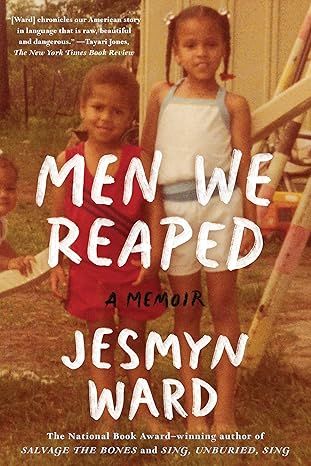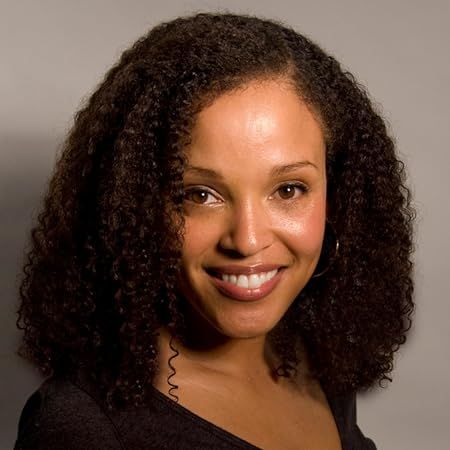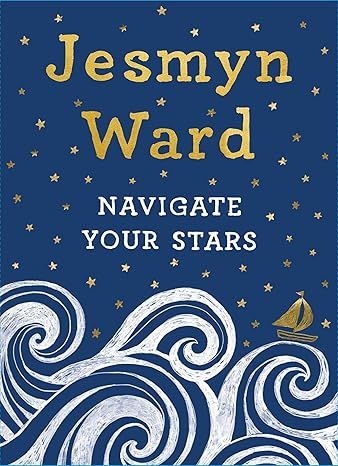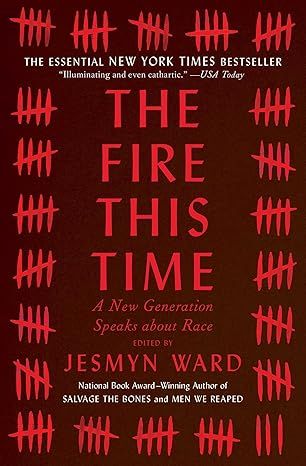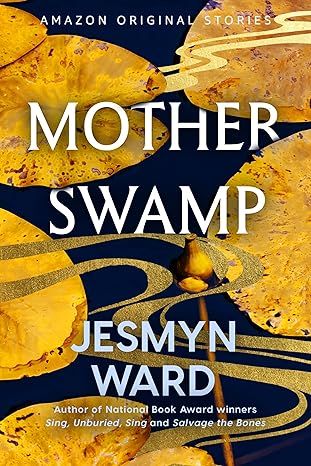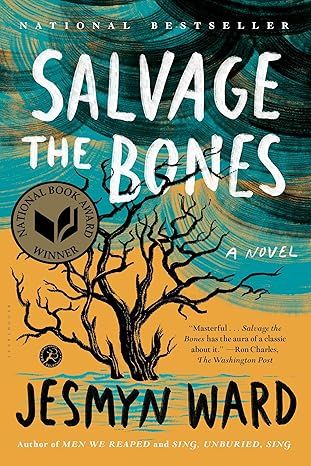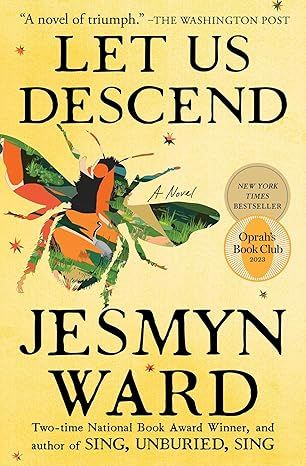Men We Reaped: A MemoirPaperback
4.5
-
2,897 ratings
Named a Best Book of the Century by The New York Times Book Review and New York Magazine
The two-time National Book Award winner and author of Salvage the Bones and Let Us Descend, contends with the deaths of five young men dear to her, and the risk of being a Black man in the rural South.
“We saw the lightning and that was the guns; and then we heard the thunder and that was the big guns; and then we heard the rain falling and that was the blood falling; and when we came to get in the crops, it was dead men that we reaped.” -Harriet Tubman
In five years, Jesmyn Ward lost five young men in her life-to drugs, accidents, suicide, and the bad luck that can follow people who live in poverty, particularly black men. Dealing with these losses, one after another, made Jesmyn ask the question: Why? And as she began to write about the experience of living through all the dying, she realized the truth-and it took her breath away. Her brother and her friends all died because of who they were and where they were from, because they lived with a history of racism and economic struggle that fostered drug addiction and the dissolution of family and relationships. Jesmyn says the answer was so obvious she felt stupid for not seeing it. But it nagged at her until she knew she had to write about her community, to write their stories and her own.
Jesmyn grew up in poverty in rural Mississippi. She writes powerfully about the pressures this brings, on the men who can do no right and the women who stand in for family in a society where the men are often absent. She bravely tells her story, revisiting the agonizing losses of her only brother and her friends. As the sole member of her family to leave home and pursue higher education, she writes about this parallel American universe with the objectivity distance provides and the intimacy of utter familiarity. A brutal world rendered beautifully, Jesmyn Ward's memoir will sit comfortably alongside Edwidge Danticat's Brother, I'm Dying, Tobias Wolff's This Boy's Life, and Maya Angelou's I Know Why the Caged Bird Sings.
Read more
Kindle
$9.49
Available instantly
Audiobook
$0.00
with membership trial
Hardcover
$26.00
Paperback
$9.99
Ships from
Amazon.com
Payment
Secure transaction
ISBN-10
1608197654
ISBN-13
978-1608197651
Print length
272 pages
Language
English
Publisher
Bloomsbury USA
Publication date
September 15, 2014
Dimensions
5.69 x 0.76 x 8.25 inches
Item weight
2.31 pounds
Product details
ASIN :
B00CIR97T8
File size :
4843 KB
Text-to-speech :
Enabled
Screen reader :
Supported
Enhanced typesetting :
Enabled
X-Ray :
Enabled
Word wise :
Enabled
Editorial reviews
“[A] torrential, sorrowing tribute to five young black men . . . Ward tells their stories with tenderness and reverence; they live again in these pages. . . . This work of great grief and beauty renders them individual and irreplaceable.” ―New York Times, 50 Best Memoirs
“Men We Reaped reaffirms Ms. Ward's substantial talent. It's an elegiac book that's rangy at the same time. She thinks back about her brother, and about her old dead friends, and about their nighttime adventures in cars. Then she declares, 'I don't ride with anyone like that anymore.'” ―Dwight Garner, New York Times
“Jesmyn Ward left her Gulf Coast home for education and experience, but it called her back. It called on her in most painful ways, to mourn. In Men We Reaped, Jesmyn unburies her dead, that they may live again. And through this emotional excavation, she forces us to see the problems of place and race that led these men to their early graves. Full of beauty, love, and dignity, Men We Reaped is a haunting and essential read.” ―Natasha Trethewey, US Poet Laureate , author of THRALL and NATIVE GUARD, winner of the Pulitizer Prize
“An assured yet scarifying memoir by young, supremely gifted novelist [Jesmyn] Ward... With more gumption than many, Ward battled not only the indifferent odds of rural poverty, but also the endless racism of her classmates... A modern rejoinder to Black Like Me, Beloved and other stories of struggle and redemption - beautifully written, if sometimes too sad to bear.” ―Kirkus Reviews (starred review)
“Jesmyn Ward is simply sui generis. I am reminded of Miles Davis' quote: 'Don't play what's there, play what's not here,' after reading her memoir Men We Reaped. This is one might virtuosic, bluesy hymn. Beautiful.” ―Oscar Hijuelos, author of THOUGHTS WITHOUT CIGARETTES
“Jesmyn Ward is an alchemist. She transmutes pain and loss into gold. Men We Reaped illustrates hardships but thankfully, vitally, it's just as clear about the humor, the intelligence, the tenderness, the brilliance of the folks in DeLisle, Mississippi. A community that's usually wiped off the literary map can't be erased when it's in a book this good.” ―Victor LaValle, author of THE DEVIL IN SILVER
“Men We Reaped is a fiercely felt meditation on the value of life that at once reminds us of its infinite worth and indicts us - as a society - for our selective, casual complicity in devaluing it. Ward's account of these losses is founded in a compelling emotional honesty, and graced with moments of stark poetry.” ―Peter Ho Davies, author of THE WELSH GIRL
“Jesmyn Ward returns to the world of her first two books, but here in the mode of non-fiction. A clear-eyed witness to the harrowing stories of 'men we reaped,' she quickens the dead and brings them, vividly alive again. An eloquent, grief-steeped account.” ―Nicholas Delbanco, author of LASTINGNESS: The Art of Old Age
“Jesmyn Ward's memoir is a miracle. In it, she writes with such clarity and beauty that her discoveries and revelations could very well change the way her readers understand the world. She also makes the unbearable nearly bearable with her poetic prose and her life-affirming passion. This is fierce, brave exploration, but it is also art - timeless, universal, and unrelentingly inspired.” ―Laura Kasischke, author of THE RAISING
“This is a beautifully written homage, with a pathos and understanding that come from being a part of the culture described.” ―Booklist
“Jesmyn Ward's heart-wrenching new memoir, Men We Reaped, is a brilliant book about beauty and death. The beauty is in the bodies and the voices of the young men she grew up with in the towns of coastal Mississippi, where a kind of de facto segregation persists.” ―LA Times
“Ward has a soft touch, making these stories heartbreakingly real through vivid portrayal and dialogue.” ―Publishers Weekly
“Winner of the National Book Award, Winner of the ALA Alex Award, Finalist for the NYPL Young Lions Literary Award, Finalist for the Dayton Literary Peace Prize, Nominee for the IMPAC Dublin Literary Award.” ―Salvage the Bones
“The novel's hugeness of heart and fierceness of family grip and hold on like [a] pit bull.” ―O, the Oprah Magazine on Salvage the Bones
“Searing.... Despite the brutal world it depicts, Salvage the Bones is a beautiful read. Ward's redolent prose conjures the magic and menace of the southern landscape.” ―Dallas Morning News
“Ward uses fearless, toughly lyrical language to convey this family's close-knit tenderness, the sheer bloody-minded difficulty of rural African American life...You owe it to yourself to read this book.” ―Library Journal on Salvage the Bones
“Salvage the Bones is an engaging novel that, on the surface, seems like a sorrowful tale of a broken household, yet holds beneath it the cherished story of family and loyalty.” ―The Root
“Men We Reaped is an important, and perhaps essential, book, in large part because this accomplished and deservedly lauded novelist somehow summoned the strength to bring us all home with her to the white-hot center of her pain, to the place where that wolf resides.” ―San Francisco Chronicle
“The good news, at least for readers, is that Ward tells a rotten fucking story fucking brilliantly. Her prose is conversational and unadorned. It's deceptively simple, until a moment of wrenching tragedy - or surprisingly often, one of astounding beauty - arrives with dangerous propulsion, knocking you off the foot that had seemed to care.” ―Willamette Weekly
“Ward creates nuanced and loving portraits of African-American men and boys...a must read.” ―The Dallas Morning News
“At a time when many claim America has moved into a post-racial era...Ward uses her family history to reach a personal, yet universal, understanding of the effects that race, class, and gender have had on her life, her community, and her generation.” ―BUST
“Sandwiched between her two National Book Award-winning novels, Ward's memoir carries more than fiction's force in its aching elegy for five young Black men (a brother, a cousin, three friends) whose untimely exits from her life came violently and without warning. Their deaths - from suicide and homicide, addiction and accident - place the hidden contours of race, justice and cruel circumstance in stark relief.” ―The New York Times Book Review
Read more
Sample
Prologue
Whenever my mother drove us from coastal Mississippi to New Orleans to visit my father on the weekend, she would say, “Lock the doors.” After my mother and father split for the last time before they divorced, my father moved to New Orleans, while we remained in DeLisle, Mississippi. My father’s first house in the Crescent City was a modest one-bedroom, painted yellow, with bars on the window. It was in Shrewsbury, a small Black neighborhood that spread under and to the north of the causeway overpass. The house was bounded by a fenced industrial yard to the north and by the rushing, plunking sound of the cars on the elevated interstate to the south. I was the oldest of four, and since I was the oldest, I was the one who bossed my one brother, Joshua, and my two sisters, Nerissa and Charine, and my cousin Aldon, who lived with us for years, to arrange my father’s extra sheets and sofa cushion into pallets on the living room floor so we all had enough room to sleep. My parents, who were attempting to reconcile and would fail, slept in the only bedroom. Joshua insisted that there was a ghost in the house, and at night we’d lie on our backs in the TV-less living room, watch the barred shadows slink across the walls, and wait for something to change, for something that wasn’t supposed to be there, to move.
“Somebody died here,” Josh said.
“How you know?” I said.
“Daddy told me,” he said.
“You just trying to scare us,” I said. What I didn’t say: It’s working.
I was in junior high then, in the late eighties and early nineties, and I attended a majority White, Episcopalian Mississippi private school. I was a small-town girl, and my classmates in Mississippi were as provincial as I was. My classmates called New Orleans the “murder capital.” They told horror stories about White people being shot while unloading groceries from their cars. Gang initiations, they said. What was unspoken in this conversation—and, given the racist proclivities of more than a few of my classmates, I’m surprised that it was unspoken—was that these gangsters, ruthlessly violent and untethered by common human decency, were Black. My school peers would often glance at me when they spoke about Black people. I was a scholarship kid, only attending the school because my mother was a maid for a few wealthy families on the Mississippi coast who sponsored my tuition. For most of my junior high and high school years, I was the only Black girl in the school. Whenever my classmates spoke about Black people or New Orleans and tried to not look at me but inevitably did, I stared back at them and thought about the young men I knew from New Orleans, my father’s half brothers.
Uncle Bookie was our favorite of my father’s half brothers. He and his brothers had spent their lives in the neighborhoods my classmates most feared. Uncle Bookie looked the most like the grandfather I’d barely known, who’d died of a stroke at age fifty. He had a chest like a barrel, and his eyes closed when he smiled. On hot days, Uncle Bookie would walk us through Shrewsbury toward the highway in the sky, to a ramshackle shotgun house, maroon in my memory, that stood on the corner. The lady who lived in the house sold ice pops out of the back. They were liquid sugar, and melted too quickly in the heat. On the walk to her yard, he’d crack jokes, gather more kids, lead us over the melting asphalt like a hood pied piper. Once our ice pops melted to syrup in their cardboard cups, once Joshua and I had licked the sugar water from our hands and arms, Uncle Bookie would play games with us in the street: kickball, football, and basketball. He laughed when the football hit one of us in the mouth, leaving it sore and swollen, his eyes slit to the thin side of a penny. On some days he would take us with our father and his pit bull to the park under the highway. There, my father fought his dog against other dogs. The other men who watched or coaxed their dogs to savagery were dark and sweat-glazed as their animals in the heat. My brother and I always stood close to our uncle. We grabbed his forearms, holding tightly, flinching as the cars boomed overhead and the animals ripped at each other. Afterward, the dogs panted and smiled while they bled, and my brother and I relaxed our grip on our uncle, and were happy to leave the shadowed world and the threat of a dog lunging outside the fighting circle.
“Daddy ain’t tell you no story about nobody dying in here,” I said.
“Yeah, he did,” Joshua said.
“You telling it,” Aldon said.
When I was in high school, I could not reconcile the myth of New Orleans to the reality, but I knew that there was truth somewhere. My father and mother sat in the front seat of the car during those early nineties visits, when they were still married but separated, when they still had the easy rapport that years of marriage engenders, and they talked about shootings, about beatings, about murder. They gave the violence of New Orleans many names. We never saw any of that when we visited my father. But we listened to the chain-link fence rattle in the industrial yard next to my father’s house and the night stretched on interminably, and we listened to my brother tell us ghost stories.
Yet we knew another New Orleans existed. We saw that when we piled into my mother’s car and rode past the red brick projects scattered through New Orleans, two-story buildings with sagging iron balconies, massive old trees standing like sentinels at each side of the buildings, women gesticulating and scratching their heads, small dark children playing angrily, happily, sulking on the broken sidewalks. I eyed the young men through the car window. Men in sagging pants with their heads bent together, murmuring, ducking into corner stores that sold POBOYS SHRIMP OYSTER. I wondered what the men were talking about. I wondered who they were. I wondered what their lives were like. I wondered if they were murderers. At night on my father’s living room floor, I asked Joshua again.
“What Daddy say happen?” I said.
“Said somebody got shot,” Joshua said.
“What somebody?”
“A man,” he said to the ceiling. Charine burrowed into my side.
“Shut up,” Nerissa said. Aldon sighed.
When we left my father to go home to DeLisle, as we did every Sunday, I was sad. We all were sad, I think, even my mother, who was trying to make their marriage work, despite the distance and the years of infidelity. She’d even been contemplating moving to New Orleans, a city she hated. I missed my father. I didn’t want to return to school in Mississippi on Monday morning, to walk through the glass doors to the large, fluorescent-lit classrooms, the old desks, my classmates perched on the backs of them, wearing collared shirts and khaki shorts, their legs spread, their eyeliner blue. I didn’t want them to look at me after saying something about Black people, didn’t want to have to avert my eyes so they didn’t see me studying them, studying the entitlement they wore like another piece of clothing. Our drive home took us through New Orleans East, across the Isle Sauvage bayou, over the gray murmur of Lake Pontchartrain, through the billboards and strip malls of Slidell into Mississippi. We took I-10 past the pine wall of Stennis Space Center, past Bay St. Louis, past Diamondhead to DeLisle. Once there, we would have exited the long, pitted highway, driven past Du Pont, shielded like Stennis behind its wall of pine trees, past the railroad tracks, past the small wooden houses set in small fields and small sandy yards, trees setting the porches in shade. Here horses stood still in fields, munching grass, seeking cool. Goats chewed fence posts.
DeLisle and Pass Christian, the two towns where all of my family hails from, are not New Orleans. Pass Christian squats beside the man-made beach of the Gulf of Mexico alongside Long Beach, the Bay of St. Louis at its back, while DeLisle hugs the back of the Bay of St. Louis before spreading away and thinning further upcountry. The streets of both towns are sleepy through much of the barely bearable summer, and through much of the winter, when temperatures hover near freezing. In DeLisle during the summers, there are sometimes crowds on Sundays at the county park because younger people come out to play basketball and play music from their cars. In the spring, the older people gather at the local baseball field, where Negro leagues from throughout the South come to play. On Halloween, children still walk or ride on the backs of pickup trucks through the neighborhood from house to house to trick-or-treat. On All Saints Day, families gather around loved ones’ graves, bring nylon and canvas folding chairs to sit in after they’ve cleaned headstones and sandy plots, arranged potted mums, and shared food. They talk into the evening, burn fires, wave away the last of the fall gnats. This is not a murder capital.
Most of the Black families in DeLisle have lived there as far back as they can remember, including mine, in houses many of them built themselves. These houses, small shotguns and A-frames, were built in waves, the oldest in the thirties by our great-grandparents, the next in the fifties by our grandparents, the next in the seventies and eighties by our parents, who used contractors. These modest houses, ours included, had two to three bedrooms with gravel and dirt driveways and rabbit hutches and scupadine vineyards in the back. Poor and working-class, but proud. There is no public housing at all in DeLisle, and the project housing that existed before Hurricane Katrina in Pass Christian consisted of several small redbrick duplexes and a few subdivisions with single-family homes, which housed some Black people, some Vietnamese. Now, seven years after Katrina, developers build two- and three-bedroom houses up on fifteen- to twenty-foot stilts where this public housing stood, and these houses fill quickly with those still displaced from the storm, or young adults from Pass Christian and DeLisle who want to live in their hometown. Hurricane Katrina made that impossible for several years, since it razed most of the housing in Pass Christian, and decimated what was closest to the bayou in DeLisle. Coming home to DeLisle as an adult has been harder for this reason, a concrete one. And then there are abstract reasons, too.
As Joshua said when we were kids hunting down ghosts: Somebody died here.
From 2000 to 2004, five Black young men I grew up with died, all violently, in seemingly unrelated deaths. The first was my brother, Joshua, in October 2000. The second was Ronald in December 2002. The third was C. J. in January 2004. The fourth was Demond in February 2004. The last was Roger in June 2004. That’s a brutal list, in its immediacy and its relentlessness, and it’s a list that silences people. It silenced me for a long time. To say this is difficult is understatement; telling this story is the hardest thing I’ve ever done. But my ghosts were once people, and I cannot forget that. I cannot forget that when I am walking the streets of DeLisle, streets that seem even barer since Katrina. Streets that seem even more empty since all these deaths, where instead of hearing my friends or my brother playing music from their cars at the county park, the only sound I hear is a tortured parrot that one of my cousins owns, a parrot that screams so loudly it sounds through the neighborhood, a scream like a wounded child, from a cage so small the parrot’s crest barely clears the top of the cage while its tail brushes the bottom. Sometimes when that parrot screams, sounding its rage and grief, I wonder at my neighborhood’s silence. I wonder why silence is the sound of our subsumed rage, our accumulated grief. I decide this is not right, that I must give voice to this story.
I’m telling you: there’s a ghost in here, Joshua said.
Because this is my story just as it is the story of those lost young men, and because this is my family’s story just as it is my community’s story, it is not straightforward. To tell it, I must tell the story of my town, and the history of my community. And then I must revisit each of the five young black men who died: follow them backward in time, from Rog’s death to Demond’s death to C. J.’s death to Ronald’s death to my brother’s death. At the same time, I must tell this story forward through time, so between those chapters where my friends and my brother live and speak and breathe again for a few paltry pages, I must write about my family and how I grew up. My hope is that learning something about our lives and the lives of the people in my community will mean that when I get to the heart, when my marches forward through the past and backward from the present meet in the middle with my brother’s death, I’ll understand a bit better why this epidemic happened, about how the history of racism and economic inequality and lapsed public and personal responsibility festered and turned sour and spread here. Hopefully, I’ll understand why my brother died while I live, and why I’ve been saddled with this rotten fucking story.
Read more
About the authors
Jesmyn Ward
Jesmyn Ward received her MFA from the University of Michigan and has received the MacArthur Genius Grant, a Stegner Fellowship, a John and Renee Grisham Writers Residency, and the Strauss Living Prize. She is the winner of two National Book Awards for Fiction for Sing, Unburied, Sing (2017) and Salvage the Bones (2011). She is also the author of the novel Where the Line Bleeds and the memoir Men We Reaped, which was a finalist for the National Book Critics Circle Award and won the Chicago Tribune Heartland Prize and the Media for a Just Society Award. She is currently an associate professor of creative writing at Tulane University and lives in Mississippi.
Read more
Reviews
Customer reviews
4.5 out of 5
2,897 global ratings
Read-A-Lot
5
Courageous and Honest
Reviewed in the United States on October 13, 2013
Verified Purchase
This is a courageous book, in that Jesmyn lays bare the contents of her life in a way that maybe few authors could or would. I felt a sense of validation, after reading in the acknowledgment, "...I was still unsure I had written a memoir." I had this sense throughout the book that wow, this is her actual story, but the writing and telling of it feels like a novel. This makes the memoir a truly great read.
In her examination of her rearing and the loss of her brother and other young men from the neighborhood, she puts a microscope on the socioeconomic conditions that keep Black people mired in grief, leading to poor choices based on hopelessness. She moves through the deaths backwards in time, in order to bring the story forward. This makes the first death, that of her brother, intersect with the present time. This was a very interesting way of framing the memoir and an accusatory look is taken at the forces of racism, economic opportunity and the lack of choices that exist among the black poor.
The community at the center of this memoir is DeLisle,MS. The reader should see this as representative of any poor economically challenged neighborhood impacted by a racist society. She clearly traces how she was haunted by the forces of poverty, history and racism. She writes, "I looked at myself and saw a walking embodiment of everything the world around me seemed to despise: an unattractive, poor, Black woman."
The deaths of the men inquired in this book could have happened, indeed does happen far too frequently in poorblack,USA. This is not endemic to the south. I can hear Malcolm X in my head chastising northerners in the 60's, who some how thought they were at a geographical advantage. Malcolm admonished, "stop talking about the south, as long as you're south of the Canadian border, you're south."
Yet, despite the deaths, the despair and the grief, Jesmyn longs for home. "I knew there was much to hate about home, the racism and inequality and poverty, which is why I'd left, yet I loved it." With all of her accomplishments, Jesmyn had the courage and fortitude to share this story and return to her home which she dearly missed. She has crafted a memoir that is one of the best I have ever read, and may her story help provide a sliver of light on the conditions that give life to the hopelessness and carelessness that exists in all the DeLisles of USA.
Read more
7 people found this helpful
Eric Selby
5
The Plight of Blacks in Mississippi Made Real
Reviewed in the United States on September 29, 2013
Verified Purchase
"I knew that I lived in a place where hope and a sense of possibility were as ephemeral as morning fog, but I did not see the despair at the heart of our drug use," writes Jesmyn Ward of the area in Mississippi where she and her three siblings as well as their large extended family grew up and where most of them--the ones who have survived that is--still live. "Men We Reaped" is a poignant retelling not only of the author's family's lives but centered around the tragic deaths of five black young men within the span of five years, beginning with her only brother's death in 2000. She uses the wolf as her metaphor, the original name of the town was Wolf. And as her ex-boyfriend said, "They picking us off, one by one." The reader experiences, although not chronologically, the deaths of these men: accidents, suicide, a shooting... When the writer describes her womanizing father's love of pit bulls that he collected for the purpose of fighting other dogs, one becomes aware of the sadistic nature of this man in the scene where he cuts off one dog's tail without benefit of sedation. And that will lead into much more about the realities of just how awful life had to have been for all these women and children, many of whom were sired outside of marriage. One of the author's sisters has a baby when she is a mere thirteen years old. And, of course, as would be expected, that baby is raised by his maternal grandmother. All the stereotypes are made flesh in this memoir: drugs and drug dealing, overdosing, under and un-employment, even cousins marrying cousins (a fine old southern tradition by white racists I thought but apparently all races in the South): "In such small towns, in communities confined by race and class, this was inevitable." (page 109) Everyone knows--I think everyone should know anyway--that Mississippi ranks 50th of all the states in illiteracy, poverty and obesity. And quite possibly in racism as well. This is what Ms. Ward writes when describing why one of the young men who dies young left school: "The fact that he was a Black male barely scraping by in his classes meant he was seen as a problem. And the school administration at the time solved the problem of the Black male by practicing a kind of benign neglect. Years later, that benign neglect would turn malignant and would involve illegal strip searches of middle schoolers accused of drug dealing, typing these same students as troublemakers, laying a thick paper trail of imagined or real discipline offenses, and once the paper trail grew thick enough, kicking out the students who endangered the blue-ribbon rating with lackluster grades and test scores." I admire Jesmyn Ward's openness about the use of drugs in her own life, in the honesty she has dared when she knows full well this book is such an indictment upon the white people who have never really done what they--we since I am one of them--should have, bringing us up to date about the horrors of what happened as a result of slavery, of the aftermath of the Civil War with Jim Crow, of the continued racism that plagues this country. Alas...this: a flaw that is hardly the author's doing is this: there are several words--nouns and verbs--that don't have the needed "s"es as well as a strange pagination: from page 59 the reader is bounced to 70. At at 89 to 70 again. This publisher needs to hire a new copy editor!
Read more
5 people found this helpful
Book Junkie
5
Beautiful Memories of Lives Taken Too Soon
Reviewed in the United States on May 8, 2019
Verified Purchase
This is a novel that will stay with the reader. Jesmyn Ward is an exceptional writer, who bares her soul and gives voices to men lost. These voices sing of the multi-generational hardships, the strength to enjoy life in near defiance of the many obstacles surrounding them. They sing of their personal experiences, granting readers a real look at what the ever-present racism shapes and that which these men will not allow to be taken, as they hold fast to what they hold most dear.
This novel and memoir are a love letter of significant value to all Americans. It shows so much beauty in love, fierce spirit, and the absolute shame of this nation in not tending to the needs of all. Again, and again we are shown the huge disparity between race, "class", and the clear knowledge that no one is better than anyone. Intellect shines through, work ethic shines through, the push for true equality yet unreached shines through the darkness of forgotten people who are, every one deserving of much, much better and far more.
My thanks go to Jesmyn Ward and her many helpers for highlighting these and other critical issues while telling her stories that say so much in her words. I pray and I will act to see a far better future for the children of these men and women. I ask you to please read this book. It has so much to say and so much more we must act upon, regardless of how much melanin the reader was born with.
Read more
Shirly Payano-Griffin
5
Honest, REAL, heart-wrenching, and LIFE CHANGING!
Reviewed in the United States on October 11, 2020
Verified Purchase
Ward’s Men We Reaped is a dedication to the lives of five young, beloved, black men she lost to car accidents, murder, and suicide within a four-year span. A revelation of hard truths about the struggles of growing up black, lacking privilege, stability, and wealth are interlaced throughout. A candid description of the harsh reality that lies behind the stigmas of life as a minority, raised in a small town in Southern Mississippi is prevalent. Her experiences with racism, inequality, and self-hate bring her heartache, despair, emotional destruction, and self-destruction via drug and alcohol abuse. Circumstances plaguing a community with poverty, violence, drugs, and mental illness as they face racism, scant opportunities, self-hate, and a lack of trust is stripped down to the most honest depiction I have ever read. Ward brings a frank awareness to outsiders looking in, to grasp the grit and the reality of what life is like every day for those born into these circumstances, causing a domino effect of tragedies. Ward’s memoir calls for a shift in thinking; a shift of understanding, versus assuming. A movement is being called to change circumstances, instead of blaming and only acknowledging differences. A change of action in wanting better for a community of people that feel they are in a death trap is being pleaded, so that they may instead see a future with hope, as Ward did. She manages to pull herself out of the quicksand that was consuming those she loved around her.
Read more
2 people found this helpful
TheraP
5
How can I get you to read this book? It’s unforgettable!
Reviewed in the United States on March 13, 2018
Verified Purchase
Jesmyn Ward is a literary alchemist. She has woven the lives/deaths of 5 young black men, together with her own memories of growing up among them, and applied her skills as a writer to elevate pain, poverty, racism, drugs, alcohol and a lack of meaningful employment for most of her contemporaries, particularly the men - to elevate all these tragic consequences of segregation and slavery - into a kind of universal tragedy, which nevertheless feels redemptive because of the telling of it. And the how of the telling.
I spent much of the tail end of this book weeping. For its sadness. For its depth. For the courage to face and write so many painful truths. For the beauty of her prose, the stark honesty in revealing so much of herself, her love and grief for those cut down so young. For the wisdom and strength of black women struggling to raise children under such conditions. For the human wreckage this nation permits. For this woman, rising up to memorialize searing and painful truths.
I cannot forget this book. As a writer Ms. Ward is the Hilary Mantel of Mississippi. Someone who has transformed her own personal pain into exquisite prose. Someone fearless in writing about emotions, deeply understanding of her characters, honest yet sympathetic in portraying things which might be unspeakable under most circumstances, but which in her hands become cathartic, almost religious, even when most terrible.
She is my new favorite writer. And I’m just sorry that at 73, there are only so many more of her future books I’ll live to read.
Read more
68 people found this helpful
Top Jesmyn Ward titles
View allBest Sellers
View all
The Tuscan Child
4.2
-
100,022
$8.39

The Thursday Murder Club: A Novel (A Thursday Murder Club Mystery)
4.3
-
155,575
$6.33

Sapiens: A Brief History of Humankind
4.6
-
140,302
$13.49

The Butterfly Garden (The Collector, 1)
4.3
-
88,556
$9.59

Things We Hide from the Light (Knockemout Series, 2)
4.4
-
94,890
$11.66

The Last Thing He Told Me: A Novel
4.3
-
154,085
$2.99

The Perfect Marriage: A Completely Gripping Psychological Suspense
4.3
-
143,196
$9.47

The Coworker
4.1
-
80,003
$13.48

First Lie Wins: A Novel (Random House Large Print)
4.3
-
54,062
$14.99

Mile High (Windy City Series Book 1)
4.4
-
59,745
$16.19

Layla
4.2
-
107,613
$8.99

The Locked Door
4.4
-
94,673
$8.53
